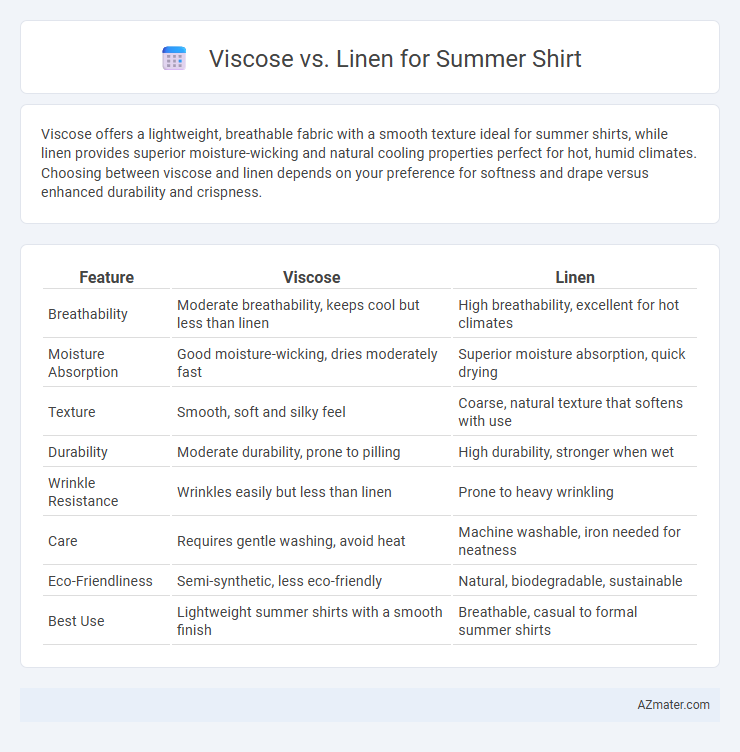Viscose offers a lightweight, breathable fabric with a smooth texture ideal for summer shirts, while linen provides superior moisture-wicking and natural cooling properties perfect for hot, humid climates. Choosing between viscose and linen depends on your preference for softness and drape versus enhanced durability and crispness.
Table of Comparison
| Feature | Viscose | Linen |
|---|---|---|
| Breathability | Moderate breathability, keeps cool but less than linen | High breathability, excellent for hot climates |
| Moisture Absorption | Good moisture-wicking, dries moderately fast | Superior moisture absorption, quick drying |
| Texture | Smooth, soft and silky feel | Coarse, natural texture that softens with use |
| Durability | Moderate durability, prone to pilling | High durability, stronger when wet |
| Wrinkle Resistance | Wrinkles easily but less than linen | Prone to heavy wrinkling |
| Care | Requires gentle washing, avoid heat | Machine washable, iron needed for neatness |
| Eco-Friendliness | Semi-synthetic, less eco-friendly | Natural, biodegradable, sustainable |
| Best Use | Lightweight summer shirts with a smooth finish | Breathable, casual to formal summer shirts |
Introduction: Choosing the Perfect Summer Shirt Fabric
Viscose and linen are two popular fabric choices for summer shirts, prized for their breathability and comfort. Linen, made from flax fibers, offers excellent moisture-wicking properties and a lightweight, textured feel that keeps the body cool during hot weather. Viscose, a semi-synthetic fiber derived from cellulose, provides a smooth, soft touch with good drape and moisture absorption, making it ideal for stylish yet comfortable summer wear.
What is Viscose? Key Features and Benefits
Viscose is a semi-synthetic fiber made from regenerated cellulose, commonly sourced from wood pulp, that mimics the feel and breathability of natural fibers like cotton. Key features of viscose include its smooth texture, excellent moisture absorption, and lightweight nature, making it highly comfortable for summer wear. Its ability to drape well and vibrant dye retention provides an added benefit for stylish, breathable summer shirts.
What is Linen? Key Features and Benefits
Linen, derived from the flax plant, is a natural fabric renowned for its exceptional breathability and moisture-wicking properties, making it ideal for summer shirts. Its key features include a lightweight texture, high durability, and natural resistance to bacteria, ensuring comfort and freshness in hot weather. Linen's ability to absorb perspiration and dry quickly enhances cooling, providing a sustainable and stylish choice for warm climates.
Breathability: Viscose vs Linen
Linen offers superior breathability compared to viscose due to its natural fiber structure that allows better air circulation and moisture-wicking, keeping the body cooler in hot weather. Viscose, while lightweight and soft, tends to retain more moisture and heat, making it less effective at ventilation during intense summer heat. Choosing linen for summer shirts ensures enhanced airflow and a drier feel, ideal for maintaining comfort in high temperatures.
Moisture Absorption and Comfort in Summer
Viscose offers excellent moisture absorption, making it a popular choice for summer shirts due to its ability to wick sweat away from the skin and promote breathability. Linen provides superior comfort in hot weather with its natural fiber structure that enhances airflow and dries quickly, reducing the feeling of dampness. Both fabrics excel in keeping wearers cool, but linen's durability and more pronounced texture can offer a crisp, breathable option compared to viscose's softer, smoother finish.
Durability and Longevity Comparison
Viscose offers a smooth, breathable fabric ideal for summer shirts but tends to have lower durability compared to linen, with fibers that weaken when wet and may pill over time. Linen, made from flax fibers, is renowned for its exceptional strength and longevity, becoming softer and more durable with each wash while resisting wear and tear. For summer shirts, linen's robust fiber structure ensures greater lifespan and sustained quality in hot, humid conditions compared to viscose.
Fabric Care: Maintenance and Washing Tips
Viscose requires gentle washing in cold water and should be air-dried to prevent shrinking and fabric damage, as it is prone to losing shape when exposed to heat. Linen, known for its durability, tolerates machine washing on a gentle cycle with mild detergent but benefits from air drying to maintain its texture and prevent excessive wrinkles. Both fabrics demand careful storage in a cool, dry place to retain their breathability and softness during summer wear.
Style and Texture: Visual Appeal of Viscose and Linen
Viscose offers a smooth, silky texture that drapes elegantly, lending a polished and refined look to summer shirts, while linen boasts a natural, slightly coarse texture that exudes casual sophistication and breathability. The visual appeal of viscose is characterized by a subtle sheen and vibrant color retention, making it ideal for stylish, lightweight summer wear. Linen's matte finish and visible weave provide a relaxed, organic aesthetic that enhances its appeal for warm-weather, effortless style.
Eco-Friendliness and Sustainability Factors
Linen is highly eco-friendly due to its natural fiber sourced from flax plants requiring minimal water and pesticides, making it a sustainable choice for summer shirts. Viscose, derived from wood pulp, often involves chemically intensive processes that can impact environmental health unless produced via responsible methods like the lyocell process. Choosing linen supports biodegradability and reduced ecological footprint, while sustainably produced viscose can offer a soft, breathable alternative with moderate environmental impact.
Which is Better for Summer Shirts: Viscose or Linen?
Viscose offers a smooth, breathable fabric that absorbs moisture effectively, making it a comfortable choice for hot summer days, while linen provides superior breathability and a natural cooling effect due to its loosely-woven fibers. Linen's durability and ability to wick away sweat make it ideal for intense heat, although it wrinkles more easily compared to the softer, silkier texture of viscose. For summer shirts, linen is often preferred for its cooling properties and eco-friendliness, whereas viscose suits those seeking a lightweight, drapey fabric with a polished finish.

Infographic: Viscose vs Linen for Summer Shirt
 azmater.com
azmater.com